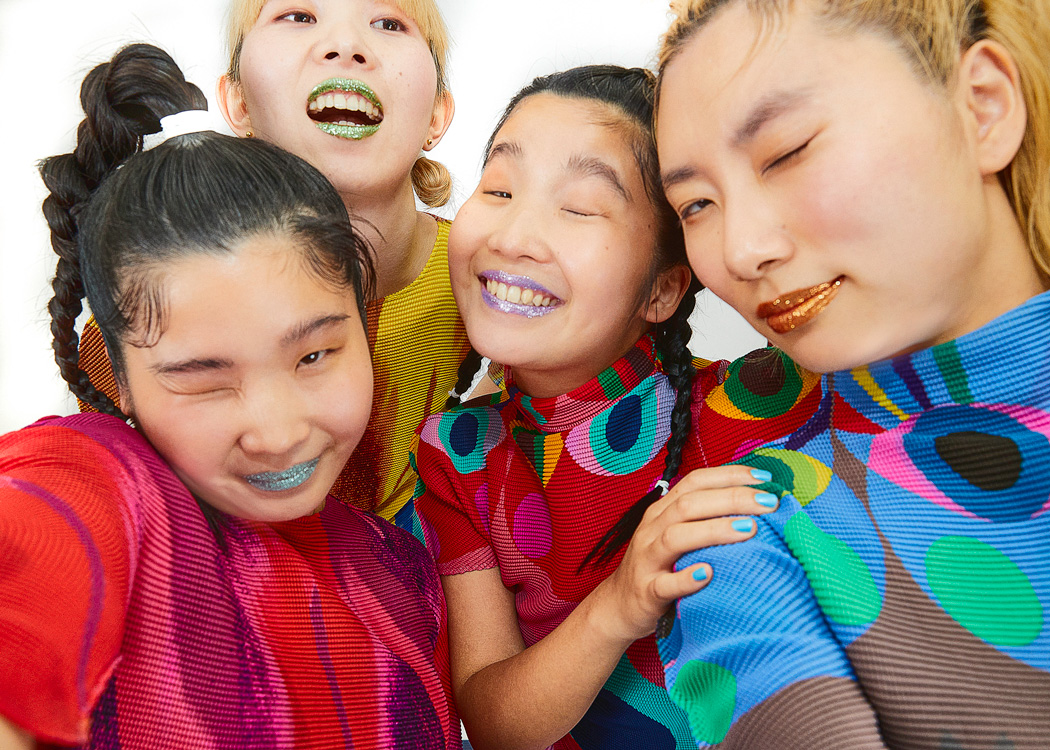Global Beat: CHAI

The members of CHAI like to think that they managed to make at least one new “friend” during the pandemic: Their new album WINK.
“During this time, it was good to be home and not around so many people—when we go outside, we stop focusing on our music,” the rising Japanese four-piece’s vocalist and keyboardist MANA says, speaking through a translator from the group’s home base in Tokyo. “This was one of the most challenging albums we’ve ever done. The biggest challenge was the sound—we had to create this album in ‘work-from-home’ status. Sometimes those feelings of not seeing anybody are sad, but I can also channel those feelings into making great music. This album was a friend.”
That might sound like weird way to think about a record, but, in actuality, her metaphor isn’t that crazy. CHAI spent the beginning days of the global lockdown writing and recording WINK using Garageband and video chat— passing music back and forth over the internet and curbing those isolating feelings with a sense of purpose. And the result is unlike anything they’ve done before, which is seemingly their blueprint for success.
Since forming in 2015, CHAI have found a remarkable audience outside of Japan— they’ve toured the U.S. and Europe frequently over the last several years, honing in on a live show that’s filled with joyful expressions, colorful costumes and choreography. But at the same time, CHAI’s underlying mission is one of subversion. The band’s mission is to challenge the Japanese concept of “Kawaii,” or the aesthetic quality of cuteness. On the band’s first two albums, PINK and PUNK, their songs were drenched in what they refer to as neo-Kawaii, or a movement to go beyond a certain look and accept people for who they are and what they look like— imperfections and all.
The thing is that it’s easy to miss all that: CHAI have a talent for making music that feels fun and lighthearted on the surface. Their lyrics, spoken in English, often repeat phrases—little meditations on life that sometimes feel like fleeting thoughts. On WINK, the band’s inaugural LP for legendary Seattle label Sub Pop, CHAI took inspiration from a disparate number of sources, such as the 2019 high-school coming-of-age flick Booksmart on the song “Nobody Knows We Are Fun.” The story behind playful opener “Donuts Mind If I Do” stems from a sign the group saw in a hotel that offered free donuts—but the band’s bassist and lyricist YUUKI turned that little moment into something more empowering, after learning that it was a play on the expression “Don’t mind if I do.”
CHAI’s origin story begins when identical twins MANA and guitarist KANA met drummer YUNA in high school; a few years later, in college, the three met YUUKI, who would fill the band out on bass. (The four musicians perform under stage names— they purposely want to keep their identities private.) They bonded over Western music— artists like the Beastie Boys and Devo.
On WINK, CHAI successfully move beyond the punky-pop sound that characterized their first two albums, weaving in an eclectic set of musical influences. Their latest songs are more steeped in classic ‘80s-pop sounds, a retro aesthetic that shines on tracks like “PING PONG!” and “ACTION,” the latter inspired by the 2020 Black Lives Matter movement. They’ve also opened up their ranks to include outside producers, as well as guest collaborators: “Maybe Chocolate Chips” features Chicago rapper Ric Wilson.
“This album was inspired by a time period that we weren’t alive for,” MANA says referencing the ‘80s vibes brimming throughout. “It was about channeling these feelings of nostalgia and saying to ourselves: ‘What if we did live through this time period?’”
“Even though we are a band, we’ve always wanted to be an artist,” YUUKI adds. “We had a lot of production and beat production, which shows a new version of us.”
The group received another unexpected shot of momentum in 2020, when they appeared on Gorillaz’s latest album, Song Machine, Season One: Strange Timez. (Gorillaz’s mastermind Damon Albarn was first turned onto the group after a member of Gorillaz’s in-house string section, the Demon Strings, came to a CHAI show in London.) It’s a perfect fit: Both groups blend their pop sensibilities with a set of equally strong visual hooks.
“Obviously, we were huge fans,” MANA says of Gorillaz, adding she saw them when she was younger at Japan’s Fuji Rock Festival. “They asked if we could do a collaboration and we said yes right away—it was a dream come true.”
As the world opens up, the CHAI secret might be spilling out in Japan. They’ve recently been featured in a commercial for an energy bar—but it’s hard for them to ascertain just how much of an impact they’ve made in their home country. A lot more photo shoots are on the dockets, and the band hopes their neo-Kawaii movement is catching on.
“This album proved to us that our songs are what we can do if we set our mind to,” YUUKI says. “It wasn’t the process of creating this album in the pandemic that was hard—the pandemic was necessary to create this album.”



















